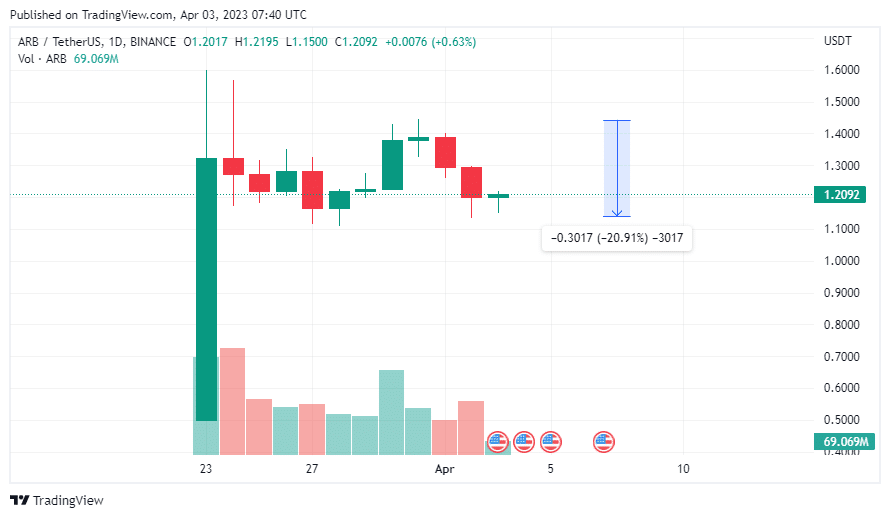The Arbitrum token price has dropped by nearly 20% over the past four days after the Arbitrum Foundation sold 50 million tokens from 750 million ARB tokens without permission from the community. At the time of writing, the ARB token price is trading at the $1.21 mark against the USDT pair.

As per the blog post on 2 April, the Arbitrum foundation has started selling ARB tokens for stablecoins without the community’s ‘ratification’, which has impacted Arbitrum’s decentralized governance strategy.
Holders of the ARB token are considered part of ArbitrumDAO, the so-called “decentralized autonomous organization” that votes on proposals such as AIP-1.
But AIP-1 wasn’t much of a vote at all, according to McCorry’s explanation – at least, not when it came to the budget requests. He said the Arbitrum Foundation has already started spending the tokens.
According to the tweet, 40 million ARB tokens out of 50 million were given as a “load to a Sophisticated actor in the financial market space.” And the rest of the 10 million ARB tokens were exchanged into cash or fiat and used to cover operating expenses.

According to CoinMarketCap, Arbitrum sits at the 39th rank based on market capitalization. In the past 4 trading sessions, the market cap declined from $1.82 Billion to $1.46 Billion.
The arbitrum Foundation viewed the Arbitrum Improvement Proposal (AIP-1) as a “ratification” of previous moves, including its ownership of 7.5% of all ARB tokens. Later on, with the intention of implementing decentralized governance, Arbitrum airdropped its ARB tokens to its users.
Also Read: Arbitrum to Airdrop ARB Token and Transition to DAO
In the blog post, Patrick McCorry stated that “the point of AIP-1 was to inform the community of all the decisions that were made in advance.” The statement fuels the issue of frustration in the community.
McCorry’s post may serve to confound what has turned into an early crisis for Arbitrum governance. Votes in favor of “ratification” were winning until the past few hours. The tide, however, has now shifted strongly toward rejection, raising questions of what will happen if AIP-1 is defeated.
Developers see a chicken-and-egg problem when setting up decentralized governance. Several things need to be considered before delving into the DAO.
Whereas AIP-1 framed the Foundation’s power to issue “special grants” without community votes as an effort to avoid “voter fatigue,” McCorry said these blank check powers are “fundamental” to the ecosystem’s competitive edge.
Also Read: Arbitrum Foundation’s ARB Token Airdrop Causes Homepage to Crash






